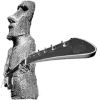Baine

Joined: Mar 08, 2008
Posts: 196
NJ shore

|

Posted on Oct 31 2008 07:47 PM
I usually use Acid Rock to do my recording, but Audacity seems to have more useful features and I'd like to try putting something together with it.
My problem is that when I do multitrack stuff, the tracks don't synch up. I'll lay down a bass line, play lead over it, but then when I play the two tracks back, the lead is usually a beat or so ahead or behind. Anyone else have that problem? Any ideas on how to correct it?
Thanks
— "We're lousy, we can't play. If you wait until you can play, you'll be too old to get up there. We stink, really. But it's great," Johnny Ramone .
|
chris_d

Joined: Oct 17, 2008
Posts: 9
MA
|

Posted on Oct 31 2008 10:27 PM
You are experiencing latency problems. This is the delay present in taking an analog signal from a microphone and converting it to digital in real-time.
You can attempt to modify the latency settings within Audacity. Shorter latencies can result in choppy or distorted sounds. It is a balancing act to determine how much is too much or too little.
Many Audacity users recommend ASIO4ALL (http://www.asio4all.com/) which is a different type of input driver that on some computers offers much better latencies.
That said, i personally was not able to get Audacity to perform "well enough" latency-wise to record any more than one track, regardless of what buggering i did.
In the end, my solution lay within another program, Reaper. It is free(well, shareware, but the demo doesn't run out and the fee is not bad if you decide to buy), and has support for a massive amount of uses, add-ons, and plugins, as well as supporting multiple inputs at once for those with multitrack recording interfaces. I like it much more than Audacity. It doesn't seem at all like the type of program that one expects to find for free/shareware.
Try it out here: http://www.reaper.fm/
Hopefully some of that is helpful. Latency issues are, IMO the most annoying part of computer recording to sort out.
-chris
|
chris_d

Joined: Oct 17, 2008
Posts: 9
MA
|

Posted on Oct 31 2008 10:37 PM
I apologize for double posting, but it occurred to me that it might also be helpful to know what your current computer and input device arrangement is.
Desktop or laptop? Is it older or newer? Are you using a recording interface or soundcard "mic in"? What soundcard is in there?
-chris
|
Baine

Joined: Mar 08, 2008
Posts: 196
NJ shore

|

Posted on Oct 31 2008 11:00 PM
Chris,
Thanks for the advice. I'll probably check Reaper out.
I'm using a dell desktop, 3.4 ghz pentium running xp with a gig of ram.
I'm running the guitar into the mic input of the soundcard, sometimes through a Zoom pedal, sometimes standalone. I believe the soundcard is some onboard the mother board cheapie - probably the weakest link in my setup.
— "We're lousy, we can't play. If you wait until you can play, you'll be too old to get up there. We stink, really. But it's great," Johnny Ramone .
|
chris_d

Joined: Oct 17, 2008
Posts: 9
MA
|

Posted on Oct 31 2008 11:20 PM
Baine
Chris,
Thanks for the advice. I'll probably check Reaper out.
I'm using a dell desktop, 3.4 ghz pentium running xp with a gig of ram.
I'm running the guitar into the mic input of the soundcard, sometimes through a Zoom pedal, sometimes standalone. I believe the soundcard is some onboard the mother board cheapie - probably the weakest link in my setup.
If you intend to use multiple tracks, more than one gig of RAM will be useful as well. One gig is fine, but particularly for playing back multiple tracks with plugin effects running, more is always better, and RAM is pretty cheap right now.
Some soundcards just don't work well for recording, but usually you can get passable results with whatever is available. If you have trouble getting a suitable latency with what you have though, the ASIO4ALL drivers can be very useful for getting something useful going on. This is true of whatever program you wish to use to record, Audacity or Reaper. I did find that Reaper worked much better however, on my setup anyhow.
Some soundcards do not need the add-on ASIO drivers as they have some of their own. I have a Creative SoundBlaster Audigy card in my desktop that has a very effective ASIO implementation in it, which outperforms the ASIO4ALL drivers. But for cards without native ASIO support, the ASIO4ALL drivers can be a big improvement.
Another option might be something in the way of a simple firewire or USB interface that would provide a more suitable preamp for you guitar or microphone signal. They can be found at pretty reasonable prices, and depending on what you use, they can allow you to sidestep an issue of a built-in audio board that might be ill-suited for recording use, without having to put a whole new card in. Does your computer have Firewire(1394) or USB 2.0 inputs?
-chris
|
Baine

Joined: Mar 08, 2008
Posts: 196
NJ shore

|

Posted on Nov 01 2008 07:30 AM
USB 2.0
— "We're lousy, we can't play. If you wait until you can play, you'll be too old to get up there. We stink, really. But it's great," Johnny Ramone .
|
Brian

Joined: Feb 25, 2006
Posts: 19287
Des Moines, Iowa, USA










|

Posted on Nov 01 2008 09:53 AM
Baine, I would guess it is your on-board sound. You don't need anything fancy, you could try getting a $50 Creative card and it might fix that problem.
— Site dude - S3 Agent #202
Need help with the site? SG101 FAQ - Send me a private message - Email me
"It starts... when it begins" -- Ralf Kilauea
|
chris_d

Joined: Oct 17, 2008
Posts: 9
MA
|

Posted on Nov 01 2008 10:39 AM
Baine
USB 2.0
If you are now plugging directly in and recording dry guitar line signal, you may want to check out an inexpensive USB interface device such as the Line6 TonePort.
The benefit, would be that it functions as its own input and Analog/Digital converter, bypassing the inefficient topology of your built-in soundcard.
The added benefit, is that the TonePort is also a guitar and preamp modeller which will allow you to dial in a nicer sound than just the guitar plugged in direct. The cheapest one is somewhere in the vicinity of $50, if i recall correctly.
If you are not computer savvy you may be able to avoid having to open up your case to replace your soundcard with a USB interface device. Not that installing an audio card and shutting off the internal card in the BIOS is so difficult, but it can be frustrating, and some folks really don't like to get into their PCs like that.
If you do go the route of looking at a new audio card however, in consumer grade(i.e. not professional, audiophile, recording styles) cards, the Creative ones are pretty good. Look for that native ASIO support in the card's feature list, and you should be able to get excellent results.
-chris
|
RecRoomSurfer

Joined: Sep 19, 2008
Posts: 206
Canada, eh?


|

Posted on Nov 01 2008 12:07 PM
Brian
... could try getting a $50 Creative card and it might fix that problem.
I use a 1.86 ghz laptop running Cakewalk Guitar Tracks. I put a Creative Sound Blaster card in the PCMCIA slot and it solved the latency experienced when using the laptop's mic input. I use the Sound Blaster's line-in for recording and line-out for playback.
|
Squierrel

Joined: Jul 14, 2009
Posts: 10
Helsinki, Finland
|

Posted on Sep 17 2009 07:14 AM
Baine
I'll lay down a bass line, play lead over it, but then when I play the two tracks back, the lead is usually a beat or so ahead or behind.
This is a known latency problem with Audacity. This could, I guess, be corrcted by using ASIO drivers, but I understood that such drivers cannot be delivered together with Audacity due to some copyright licencing issues.
However, I've just learned to cope with it. It is relatively easy to move the recorded track and correct the sync. It helps if you first make a click track or record the drums first. After that it is easy to visually align the start of the bit you've just recorded with the correct click or drumbeat.
|


































